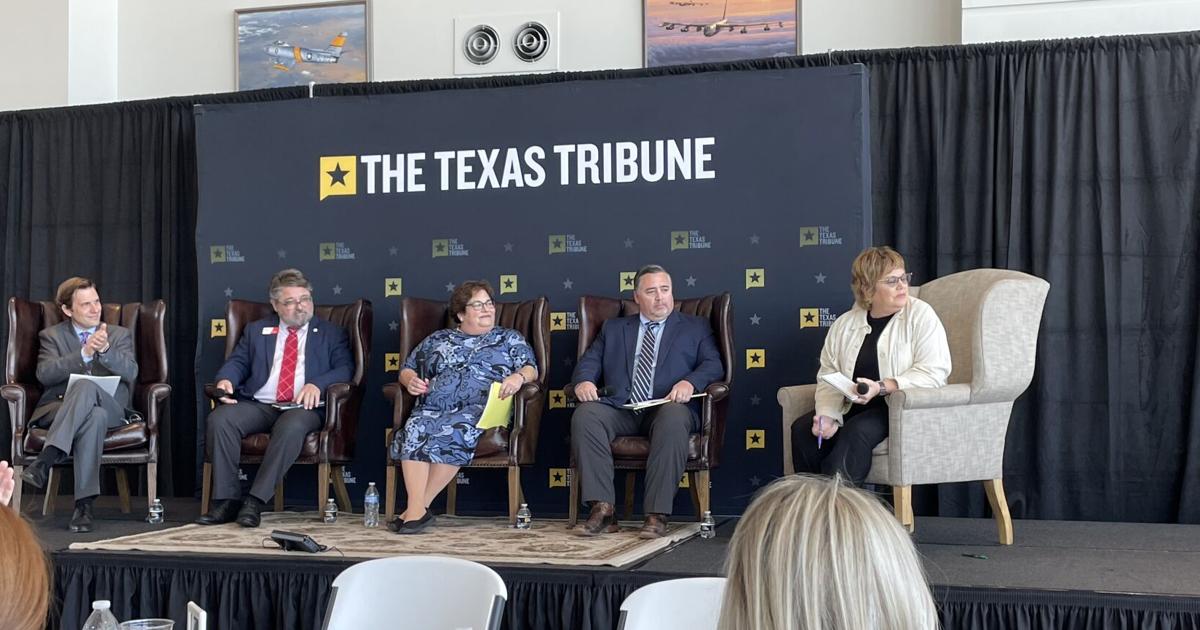Legislative support for more community health center training could help Texas ensure it has the doctors, nurses and other medical staff it needs, Waco Family Medicine CEO Dr. Jackson Griggs said Tuesday during a panel discussion round with state and national health leaders.
The panelists agreed that there are not enough doctors, nurses, medical staff and mental health professionals in rural Texas counties and counties bordering Mexico for all Texans to have access to the care they need without a long commute.
The Texas Tribune hosted the discussion Tuesday at Texas State Technical College on the question “How will Texas meet its health care workforce needs?”
WATCH NOW: The Texas Tribune hosted a Texas Health Workforce Conversation in Waco at Texas State Technical College's Col. James T. Connally Aerospace Center on Tuesday, April 23.
Speakers include:
Maria Darby, Director of Operations, Dwyer Workforce Development
Jackson Griggs, MD, CEO, Waco Family Medicine
Darrel Spinks, executive director of the Texas Behavioral Health Executive Council
Andy Weaver, chancellor of Texas State Technical College's West Texas campuses
The conversation was moderated by Terri Langford, the Tribune's health and human services editor.
Griggs put his finger on the pulse of the health care workforce problem that is prevalent not only in Texas but across the United States. Texas has 182 health care professionals for every 100,000 residents, he said. In the United States, this figure is 232 health professionals for every 100,000 people.
People also read…
The shortage of professionals is perhaps even more severe for mental health care, said Darrel Spinks, executive director of the Texas Behavioral Health Executive Council, the agency that licenses all mental health professionals in the state. .
“Statewide, 80 percent of our counties are mental health deserts,” Spinks said during Tuesday's discussion.
Spinks encouraged the Legislature to update certification standards for all mental health professionals and to reduce the burden on professionals in good standing from other states to obtain a license to practice in Texas.
Griggs said American health care is well designed to care for the elderly and not well enough to care for the young and middle-aged. He called for the Legislature to require all health insurance companies operating in Texas to spend more than 4% on primary care. He said other industrialized countries spend 14% on primary care.
Griggs also said burnout is a problem that causes doctors and nurses to retire early or leave the professions before retirement. Spinks said his agency sees the same problem among mental health doctors.
Panelist Andy Weaver, chancellor of TSTC's West Texas campuses, said it's important for businesses that provide health services in rural communities to have the support they need to be able to pay better wages, so they nurses, paramedics and doctors can make a good living. in these areas and not have to move to bigger cities. Weaver also said training more doctors of all types is needed to solve the problem.
Maria Darby, chief operating officer of Baltimore-based Dwyer Workforce Development, said her company offers “comprehensive services” for students who may need help with child care, food insecurity, housing or other barriers to training. Dwyer is a non-profit organization that trains individuals as Certified Nursing Assistants and Geriatric Nursing Assistants. It bought 50 skilled nursing facilities across the state in a $590 million deal nearly two years ago. In addition to training people for jobs at its own facilities, Dwyer trains staff for other companies.
“There is a significant opportunity to do good, and to do it well, for those with a caring disposition who want to help others,” Darby said.
There are many jobs available in health services, especially jobs that serve the elderly, and many of the jobs pay well, she said.
Technical colleges, community colleges and high schools can also train people for healthcare work, Darby said.
In Waco and surrounding cities, the Advanced Health Academy of Greater Waco trains high school students as certified nursing assistants and high school students as physician assistants, said Matt Rambo, dean of the academy at Waco Independent School District.
“The nursing homes hire our CNAs and our two hospitals in Waco, Hillcrest and Providence, hire our medical assistants,” Rambo said. “They can't get enough.”




